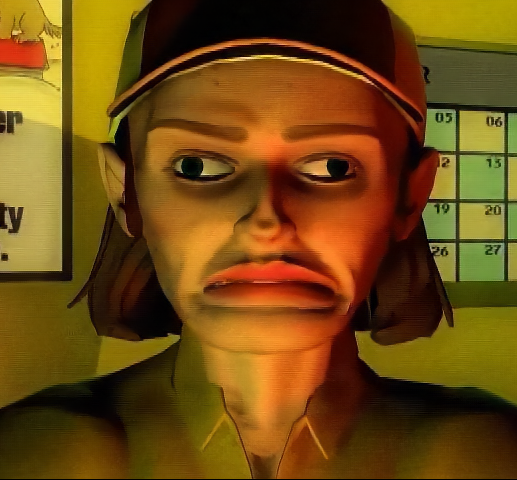Caption: an interview dialogue
- Are dark matter models unsuited to explain observations? [the “dark matter models” and “to explain observations” parts are poorly edited onto the image, overlaying the original text]
- In my view, they are unsuited.
- Why?
- That’s my opinion, don’t ask me why.
End of caption
Dark matter is the mainstream among physicists, but internet commentators keep saying it can’t be right because it “feels off”.
Of course, skepticism is good for science! You just need to justify it more than saying the mainstream “feels off”.
For people who prefer alternative explanations over dark matter for non-vibe-based reasons, I would love to hear your thoughts! Leave a comment!
Anakin: In my view, it’s the observations that are wrong!
Dark matter (WIMPs) has a lot of known issues, the largest one being that we should probably already have seen it (but not certainly, we just excluded almost all of it, not all). None of those is strong enough to really kill the theory, it is still the best one we have, but to firmly believe in it is something else.
But yeah, AFAIK the judge is still out on whether this is even a change from the previous model or we just calculated things wrong.
WIMP is only one model of dark matter. A favorite of particle physicists. But from a purely astrophysics point of view there is little reason to believe dark matter to have any interaction beyond gravity.
What was it Anton on YT said once? Something about maybe Dark Matter turns out to be a boring “brute fact” that the only property it has is a weak interaction and nothing else.
Particle physicists love the Weakly-Interacting Massive Particle dark matter model. But from a purely astrophysics point of view there is little reason to believe dark matter to have any interaction beyond gravity.
All models are wrong. Some are useful.
Some are less wrong than others, depending on the application.
This, a model is a human tool and it’s as useful as it is useful.
Didn’t someone come up with an alternative model that said that, because galaxies vary in mass, time must also varies between galaxies; and said model was able to predict the effects of dark matter and dark energy?
Edit: it seems like a painfully obvious statement, which is why it confused me when I first read it. Like, no shit time is gonna vary between galaxies due to differences in mass.
That disputes dark energy accelerating the expansion of the universe. But AFAIK it doesn’t explain dark matter.
Still, I find it very compelling. And I hope it might also solve the crisis in cosmology. At the very least it should get rid of the lambda in lambda CDM.
I’ve heard of something similar that is able to predict an effect of dark matter (the rotation curves), but AFAIK it couldn’t match other observations (bullet clusters, etc.) correctly.
Do you have a link for the model you’re talking about. I’m curious.
You’re (probably) thinking of timescape cosmology theory!
Off topic, but what is the original source of the meme?
It’s a classic MEMRI TV meme. What MEMRI TV is would require a … “nuanced” explanation that I don’t want to get into here. Look it up on Reddit or start a thread on [email protected]
MOND is my personal favorite way to avoid dark matter.
MOND is a wonderful way to explain rotation curves but since then with new observations (bullet cluster, gravitational lensing, …) MOND doesn’t really hold up.
You might consider reading Accelerated Structure Formation: The Early Emergence of Massive Galaxies and Clusters of Galaxies. The paper is absolutely wonderful. The main thesis of the paper is, “Wow, the James Webb Telescope sure has been finding some remarkably mature galaxies for the early universe. Maybe we should consider the possibility that the models we use to predict galaxy formation, specifically lambda CDM, are incorrect and Non-Physical.”
The author states the difficulty in the conclusion:
Despite the predictive successes of MOND, we do not yet know how to construct a cosmology based on it. In contrast, ΛCDM provides a good fit to a wide range of cosmological observables but does not provide a satisfactory explanation of the many phenomena that were predicted by MOND, nor is it clear that it can do so. We find ourselves caught between two very different theories that seem irreconcilable despite applying to closely related yet incommensurate lines of evidence.
The complaints about the early maturation of galaxies seen by the JWST was widely reported. My favorite line from that article:
“Maybe in the early universe, galaxies were better at turning gas into stars,” Chworowsky said.
Sure, it’s not that our theories of cosmology are incorrect; things like star formation were just different back in the early universe. I guess you just had to be there.
I’m still far from convinced about MOND. But I guess now I’m less confident in lambda CDM too -_-
I’m inclined to believe it’s one or many of the potential explanations in your second link. But even then, those explanations are mostly postdictions so they hold less weight.
I love the idea of MOND but it does seem like evidence is not in its favour overall. I remember getting an (I think) Scientific American magazine that featured it and I thought the idea sounded awesome. Unfortunately the universe doesn’t care what we think haha
To which McGaugh et al. had this delicious reply:
One does not simply turn all the available baryons into stars.

More memri tv crossovers please



